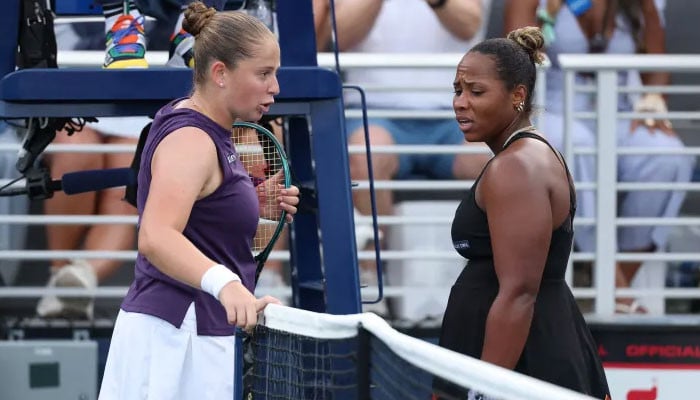 |
| Jelena Ostapenko argues with Taylor Townsend following their second-round match at the US Open. — AFP/File |
Ostapenko Apologizes for Controversial ‘No Education’ Comment to Townsend
Ostapenko Apologizes for ‘No Education’ Remark Toward Townsend, Citing Etiquette Misunderstanding
Latvian star Jelena Ostapenko apologizes to Taylor Townsend after accusing her of “no class” and “no education” post-match in the US Open. She clarifies the comment was about tennis etiquette, not personal worth.Jelena Ostapenko argues with Taylor Townsend following their second-round match at the US Open. — AFP/File NEW YORK: Jelena Ostapenko apologised for the words she used in a tense altercation with American Taylor Townsend at the US Open that led to backlash, saying on Saturday that...
Tension sparked on a New York net after Taylor Townsend beat Jelena Ostapenko 7–5, 6–1 in a second-round US Open match. What began as a heated post-match handshake turned into a public apology when Ostapenko accused the American of having “no class” and “no education” for failing to apologize after winning a point via a net cord—an unwritten but respected tennis courtesy.
Townsend, visibly taken aback during her on-court post-match interview, noted that Ostapenko’s choice of words carried potential racial undertones—compounding the scrutiny, especially given Townsend’s identity as a Black player. Naomi Osaka weighed in as well, calling Ostapenko’s words “the worst things you can say to a Black player in a majority-white sport,” pushing the controversy into the spotlight.
A Public Apology and a Cultural Learning Moment
Three days later, Ostapenko took to Instagram to apologize. She clarified that English isn’t her first language and that her use of “education” was meant to reference tennis etiquette—not personal intelligence or background. She explicitly acknowledged that her phrasing could offend—and pledged to learn and grow from the incident.
Townsend responded to the apology with grace, stating, “That’s nice... that’s cool.” But she also shared a broader perspective—emphasizing that the moment served as a lesson for Ostapenko: you can’t expect people to react the way you want, and it’s better to focus on your own game.The Broader Implications
The incident has sparked a larger conversation about sportsmanship, language, and respect in tennis. While the post-match handshake isn’t codified in rulebooks, it reflects a deeper tradition within the sport—one that transcends technicalities to embody dignity and mutual recognition. Moments like this highlight how a simple gesture or word can resonate far beyond the court.For Townsend, the exchange amplified her platform in a valuable way. She fired back in the next round with poise and focus—defeating the No. 5 seed Mirra Andreeva. Her composure spelled a shift: beyond tennis, she became a symbol of resilience and authenticity.
Meanwhile, Ostapenko’s apology reflects a rare and human response under pressure: owning a mistake, clarifying intent, and offering an olive branch—three steps not always easy in the competitive, high-stakes world of professional sports.
Tags
Sports
